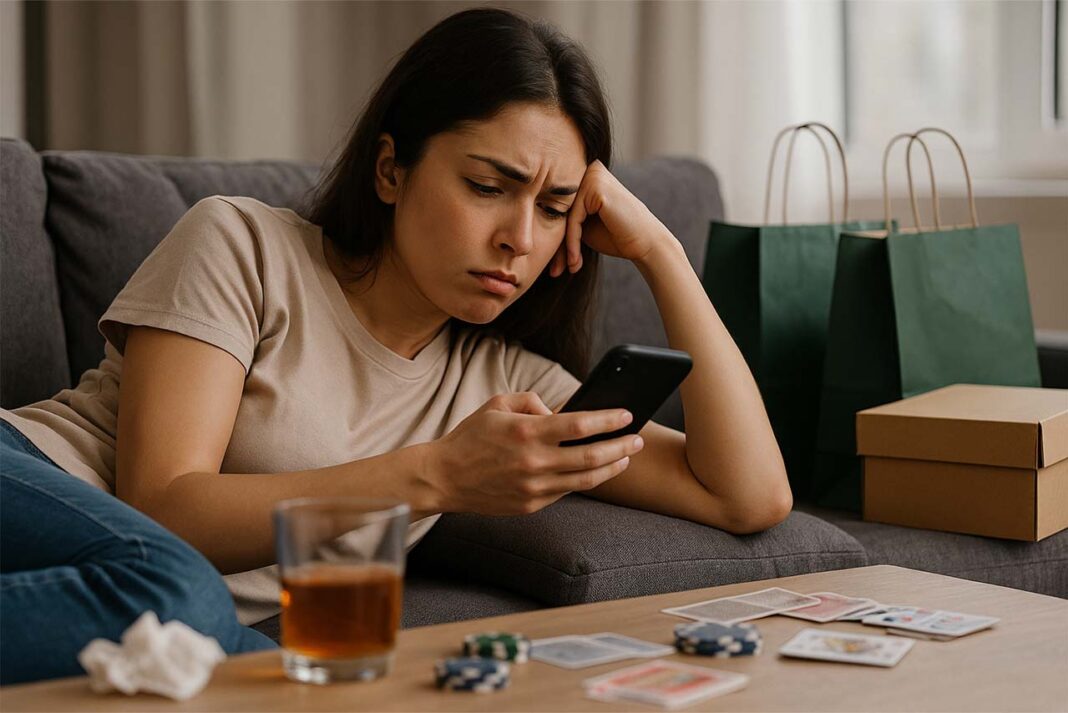As most of the people are still struggling with addiction such as alcohol and gambling, new addictions have begun to arise as the world changes. Many people in the world have become inevitably struggling with social media and consumption addiction with the development of technology.
Access to technology and the internet is so easy these days. After the pandemic, the virtual world has become even more prevalent in our lives. Especially our phones are a big part of our lives. This accessibility is pushing people into social media addiction. We can’t stay away from social media. Even before saying “good morning,” the first thing we look at when we wake up is our phone. If we stay away for a while, we can experience FOMO (fear of missing out). Even if we don’t realize it or see it as a serious problem, many people around the world are addicted to social media.
Social media addiction is considered a behavioral addiction in psychology. When people use social media, the news, likes, and comments they receive activate the brain’s reward system and release dopamine. This situation has the same effect as other addictions, such as gambling. A person feels satisfaction from social media use, and the frequency of occurrence increases because this behavior is positively reinforced. Individuals who frequently experience negative emotions like stress and loneliness are more likely to fall victim to this reward system.
Because social media is seen as an escape from reality, some people use it to manage their negative emotions. This provides short-term relief, but it can make us more addicted in the long term. Furthermore, social media can cause increased stress and anxiety. Because people always share their best, most productive, happiest, and most beautiful selves on social media, they never reveal their flaws or negativity.
A person can create an ideal self by comparing themselves to these people, using them as role models, and thinking they should be like them. As humanist psychologist Carl Rogers emphasized, people may become aware of the difference between their Real Self (themselves) and their Ideal Self (the person they dream of becoming), leading to psychological disorders such as depression and eating disorders.
The Rise of Consumption Addiction
Another type of addiction that has entered our lives with social media is consumption addiction. Especially with the rise of influencers and the convenience of online shopping, people constantly buy trending items, then get bored with them and buy new ones. This leads to creating a terrible and inextricable cycle.
In psychology, this situation can be considered compulsive behavior. When a person is very stressed and obsessions (irresistible thoughts) begin to form in their brain, they may head towards consumption (compulsion) to suppress these obsessions. Because this behavior releases dopamine in the brain, it reduces stress and makes the person happy. However, this situation pushes the person back into a vicious cycle.
When a person experiences a negative emotion, such as sadness, they find themselves buying something. I also want to evaluate this situation sociologically. On behalf of purchasing power, which has decreased in Turkey in recent years, buying expensive items has become perceived as a sign of status and power. People unconsciously buy products because they’re expensive or popular, without paying attention to their quality.
Famous brands offer us low-end products; we buy them without complaining, but we can use them only a few years and then need new ones. This significantly affects consumption. On the other hand, when people don’t have these products, they experience self-esteem issues. They develop a perception that “everyone has them, so why don’t I?” They feel like they’re missing something, leading to a sense of inadequacy.
This consumption isn’t limited to just products. We’ve become voracious consumers of news. We quickly forget good or bad news and move on with our lives. Events that would have affected an entire society in the past create a huge impact on their first day and are forgotten within a few days, just like products. This consumerism also seriously weakens our memory.
The Psychological Impact of Addiction
Social media and consumption addiction, like gambling and alcohol, are leading to serious addictions. People are not very aware of this and don’t take it seriously. However, I believe people will start getting therapy in the future. These addictions are like invisible chains on our feet — we don’t see them, but we feel them because we can’t move forward and break free.
The only way to overcome addiction is to live real life — establishing real connections and relationships. For example, when we feel sad, we should confront our feelings instead of running away and scrolling through social media or shopping. If someone is causing this, we should go and talk to them.
Sweeping emotions under the carpet and pretending they don’t exist leads to even greater destruction in the future. We should minimize our social media use and remember that not everything we see there is real — that people we see on social media experience sadness and bad days just like us.
Believing in a false sense of perfection and setting unattainable targets makes us feel inadequate. We should never lose touch with reality at any point in our lives and accept the black and white of all events. Only when a person accepts their addictions can they be aware of them and recover from them.


